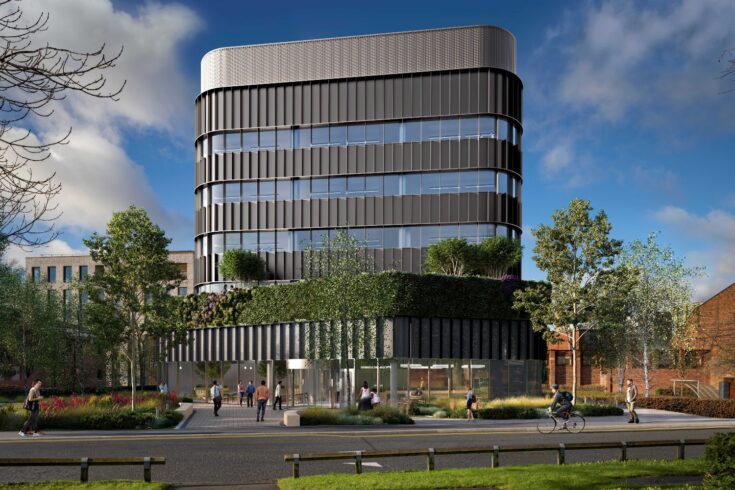This follows an application by the Medical Research Council (MRC) to the UK Research and Innovation (UKRI) Infrastructure Fund to support UK Biobank’s development.
The new facility
UK Biobank’s biological samples, laboratories, headquarters and around half of its 250 staff will move to the new facility.
The funding will cover a latest-generation robotic freezer four times faster than the existing facility, to store and retrieve 20 million biological samples that have been donated by UK Biobank’s 500,000 volunteer participants.
The facility is being developed with the support of The University of Manchester, and will enable new projects to turn the samples into data and drive discoveries into how to prevent and treat a wide range of diseases.
Conducting vital research
Professor Sir Rory Collins, Principal Investigator and CEO of UK Biobank said:
We are thrilled to be moving to a world-leading centre for genomics and data, where we can build on existing relationships with The University of Manchester.
We are incredibly grateful to UKRI for their funding and support, which will enable us to consider new ways to enrich the data and make UK Biobank even more valuable for health research.
The improved technologies and capacity at our new home will also make it quicker and easier for researchers from around the world to conduct vital research into common and life-threatening diseases and enable new scientific discoveries that improve human health.
An essential resource
Professor Dame Ottoline Leyser, Chief Executive of UKRI , added:
UKRI is proud to invest in cutting-edge infrastructure across the UK to drive discovery, strengthen innovative businesses and improve public services, creating a wide range of high-quality jobs.
UK Biobank is one of the UK’s leading biomedical science infrastructures, providing essential resources for thousands of academic and industry projects in the UK and around the world.
Demand is growing year-on-year as UK Biobank’s datasets get richer over time. The insights enabled by UK Biobank have already driven change in the NHS and we look forward to seeing this powerful resource continue to thrive.
New opportunities
Relocation to the Greenheys site on Manchester Science Park will provide UK Biobank with new opportunities for collaboration with multidisciplinary researchers and industry.
It will also offer access to additional talent due to the proximity to leading institutions operating across research, academia, business and the NHS.
The move will also support the government’s ambitions stated in the ‘Levelling Up’ White Paper to increase research and development spending outside the Greater Southeast by over 40% by 2030.
The new scheme is subject to planning approval by Manchester City Council.
Further information
Over the course of the next decade, UKRI’s infrastructure funding will support:
Development of the new purpose-built facility at Manchester Science Park
This is located within Manchester’s Oxford Road Corridor (ORC). Under the proposed arrangements, UK Biobank will occupy three floors of a new building, to be constructed on the Greenheys site, which will house upgraded biological sample storage, processing laboratories and offices.
The University of Manchester, Bruntwood SciTech,is a joint venture between Bruntwood and Legal & General and the City of Manchester. They have worked together with UKRI and UK Biobank to develop plans for the new facility, which is expected to break ground in autumn 2023 and be operational in 2026, subject to planning permission.
Replacement of UK Biobank’s outdated infrastructure
Current infrastructure will be replaced with a more modern robotic storage archive for its existing 16 million biological samples. This will provide capacity for future sample collections, quadrupling speed of retrieval to meet increasing demand from global researchers, and improving environmental efficiency.
Enhancement of UK Biobank’s data assets
The data assets will be enhanced to broaden the dataset and improve tools for researchers and industry. This will include linking to further health records and socio-economic and environmental data.
UK Biobank will be able to take advantage of public, philanthropic and industry investment to undertake new sample collections, assays and other enhancements, having previously been constrained by outdated infrastructure.
New links with Manchester’s life and data sciences enterprise system
In particular given the proximity to The University of Manchester and its strength in growth areas including artificial intelligence, diagnostics, digital and biotechnology.
The relocation will bring opportunities for UK Biobank and the university to stimulate innovation, health impact and economic growth.
This partnership will also be pivotal to the local, regional and national life sciences ecosystem and the presence of their research and intellectual property will help foster new treatments and cures.
Development of a ‘hub’ to engage with new and existing collaborators
The hub will promote academic, commercial and public health links in the Manchester region and beyond. With a particular focus on start-up and small and medium-sized enterprises engagement.
The generation of intellectual property will be encouraged by collaboration between UK Biobank, The University of Manchester, Bruntwood SciTech and its customers and the NHS.
Existing organisations, including Health Innovation Manchester, will foster collaboration between UK Biobank, researchers, industry and the NHS. This will mean that new tests, treatments and products can be accessed by the people of Greater Manchester faster here than in any other region.

